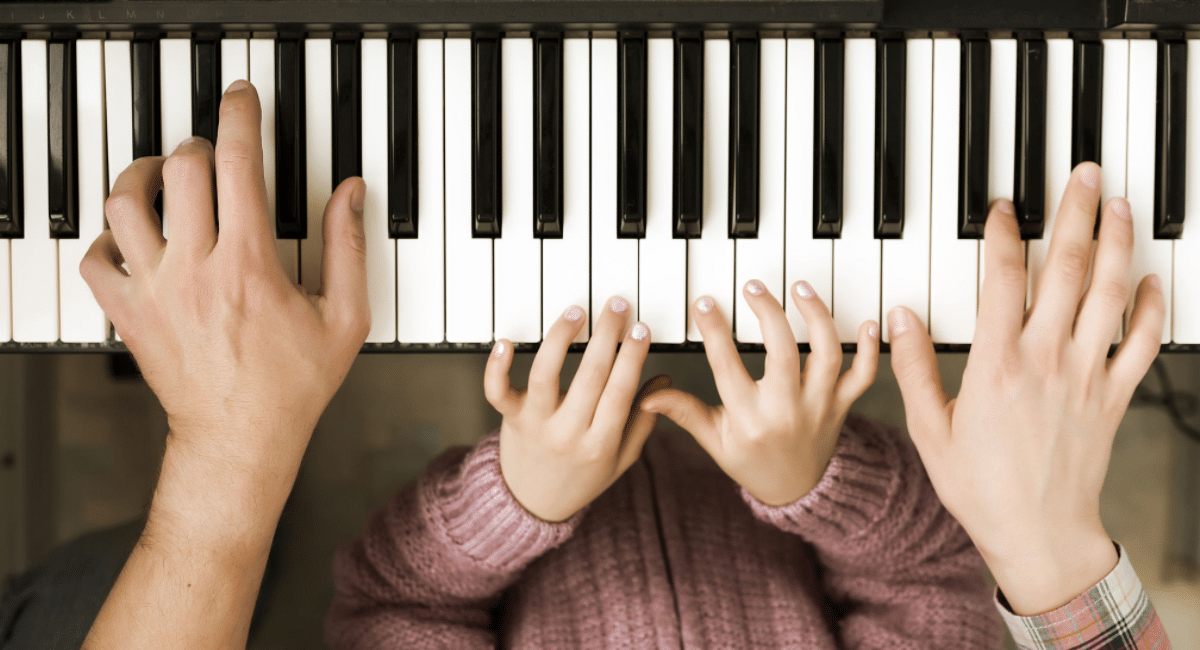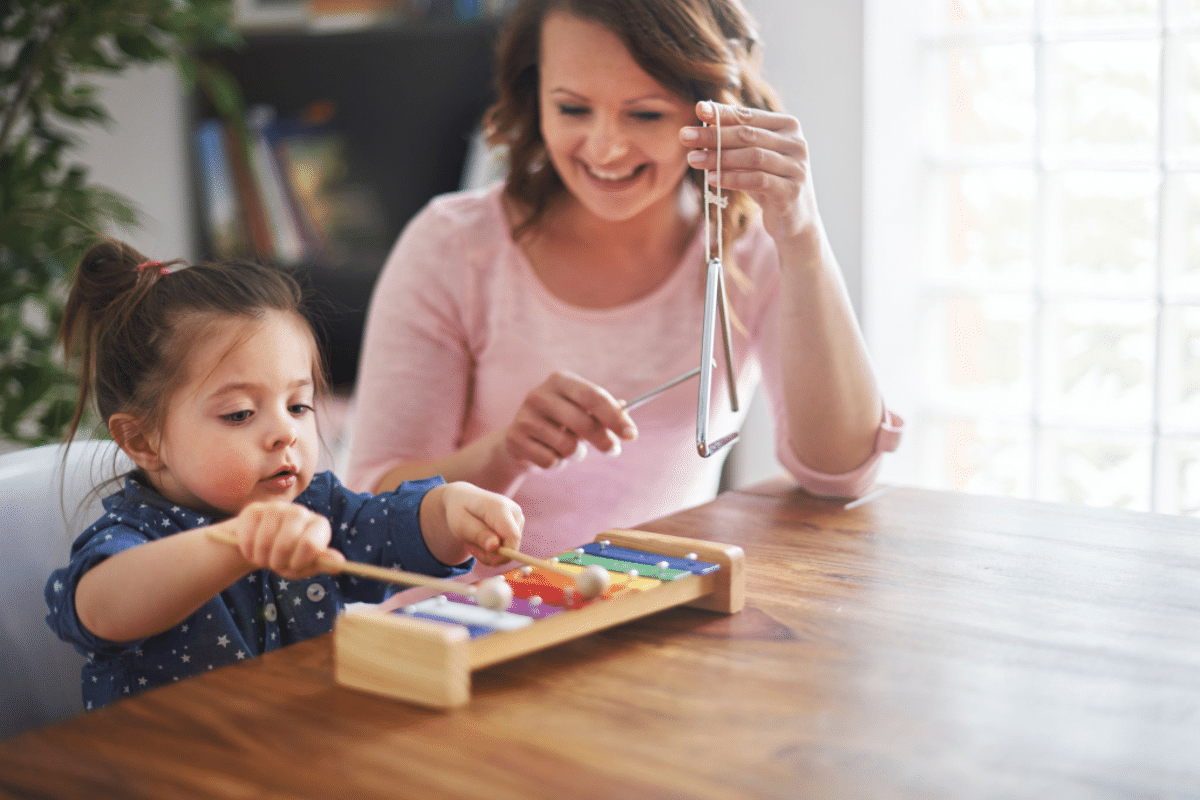In the stages of early childhood, few things hold the transformative power that music does. For parents navigating the beautiful yet complex journey of raising infants, recognizing the profound benefits of music on their little ones’ cognitive, linguistic, and emotional well-being is not only enlightening but crucial.
As the curtains of parenthood rise, the introduction of music to a baby’s world unveils a realm of possibilities, connecting chords to developmental milestones. From the gentle lullabies that cradle them to sleep to the upbeat rhythms that accompany moments of play, every note contributes to the intricate tapestry of their growth.
In this exploration, brought to you by Motherhood Center, we embark on a harmonious journey, delving into the enchanting benefits that music bestows upon our youngest family members. Join us as we unravel the melodies that shape cognitive architecture, enhance language skills, and foster emotional harmony in the hearts of our precious babies. The stage is set, and the orchestra of development awaits.
How Music Shapes Growing Minds
Discovering the wonders of music is like opening a door to a world of possibilities for your baby’s mind. Let’s explore how this magical realm of melodies contributes to their cognitive development, setting the stage for a future of curiosity and intellectual growth.
Music: A Catalyst for Neural Stimulation
Think of music as a gentle spark for your baby’s brain. Whether it’s the soothing hum of a lullaby or the playful tunes of nursery rhymes, these sounds act like a catalyst, stimulating neural activity. Picture your baby’s brain as a sponge, eagerly absorbing these musical notes and forming intricate connections. The result? Enhanced pathways that lay the foundation for improved cognitive functions.
Enhancing Memory and Recognizing Patterns
Now, let’s dive into the repetition within musical compositions. This aspect provides an ideal playground for your baby’s memory and pattern recognition to flourish. As they listen to familiar tunes, their brain becomes skilled at recognizing sequences. This isn’t just about remembering melodies; it extends into various aspects of learning, creating a strong foundation for memory skills in general.
Rhythmic Patterns and Cognitive Skills
Consider rhythm as the heartbeat of music, influencing more than just your baby’s sense of movement. Regular exposure to rhythmic patterns is like a workout for cognitive skills. It helps in developing coordination, concentration, and a deeper understanding of spatial concepts. It’s not just about moving to the beat; it’s about syncing the mind to the rhythm of growth.
As you embark on this musical journey with your baby, remember that each note is more than a sound—it’s a key to unlocking their cognitive potential. Through these experiences, you’re laying the groundwork for a future filled with curiosity and intellectual prowess. So, let the melodies guide your baby’s exploration into the vibrant world of learning.
Language Skills and Musical Exposure
In the enchanting interplay between melody and language, music emerges as a potent tool for fostering the development of language skills in your baby. This section uncovers the intricate ways in which exposure to music becomes a linguistic journey, weaving a tapestry of communication that goes beyond words.
The Melodious Bridge to Language Acquisition
From the earliest coos to the first words, the melody of language is often intertwined with the melodies of music. Babies instinctively respond to the rhythmic patterns and melodic variations in songs, creating a bridge to language acquisition. As they listen and engage, they absorb the cadence and tonality that lay the groundwork for verbal expression.
Building Vocabulary through Rhymes and Songs
The playful nature of many nursery rhymes and children’s songs is a linguistic treasure trove. The repetitive nature of lyrics introduces your baby to a rich array of vocabulary in a context that is engaging and memorable. Through the joyful repetition of familiar tunes, their vocabulary blossoms, setting the stage for effective communication.
Expressive Language Development through Musical Expression
Beyond mere words, music encourages your baby to express themselves in a non-verbal yet communicative manner. Whether through spontaneous movements, gestures, or even attempts at humming along, the act of responding to music becomes a form of expressive language development. It’s a delightful dance where communication extends beyond the limitations of words.
As you embark on this melodic journey with your baby, recognize that each lyric and every tune contributes to the development of language skills. Through music, you provide them not just with sounds but with the keys to unlock the vast world of communication that awaits them.
Choosing the Right Music for Your Baby
In the vast musical landscape, selecting the right tunes for your baby involves more than just creating background noise—it’s about curating an auditory experience that resonates with their developmental needs. This section explores the nuances of choosing music that aligns with different moments and activities in your baby’s day.
Gentle Tunes for Calming Moments
In moments of tranquility or bedtime routines, opt for gentle and soothing tunes. Soft lullabies or instrumental pieces with a slow tempo create a serene atmosphere, aiding relaxation and preparing your baby for sleep. Consider melodies with simple arrangements to avoid overstimulation during these calming interludes.
Upbeat Rhythms for Playful Interaction
When playtime arrives, embrace the energy of upbeat rhythms. Playful songs with lively tempos not only capture your baby’s attention but also encourage movement and engagement. Consider incorporating interactive elements, such as clapping or gentle swaying, to enhance the playful experience and promote motor skill development.
Exploring Various Genres for Diverse Stimulation
Diversify your baby’s musical exposure by exploring various genres. Exposing them to a range of musical styles—classical, jazz, folk, or world music—introduces diversity in sounds and rhythms. Each genre brings a unique flavor to their auditory experience, contributing to a well-rounded musical palate and fostering a broad appreciation for music.
As you navigate the vast array of musical options, remember that variety is key. Tailoring the musical soundtrack to different moments in your baby’s day not only enhances their sensory experience but also promotes a holistic approach to musical engagement, contributing to their overall development.
Incorporating Music into Daily Routine
Infusing your baby’s daily routine with the magic of music transforms ordinary moments into rhythmic, engaging experiences. This section explores how the intentional integration of music into various activities contributes to a harmonious daily routine, creating a soundtrack for their early years.
Musical Morning Rituals for a Positive Start
Begin the day with a musical awakening. Choose uplifting tunes or playful songs to set a positive tone for the morning. Whether it’s a gentle melody during diaper changes or a cheerful song during breakfast, incorporating music into the morning routine establishes a joyful atmosphere, signaling the start of a new day.
Midday Melodies: A Tool for Transitions
Use music as a seamless transition tool between activities. When moving from playtime to naptime or switching from one play activity to another, introduce short musical interludes. This not only eases transitions but also provides a consistent and familiar cue for your baby, helping them navigate the shifts in their daily routine.
Serenading Sweet Dreams: Bedtime Lullabies
As bedtime approaches, create a calming musical ritual to signal the transition to sleep. Choose soothing lullabies or gentle instrumental pieces to accompany the winding down process. Consistent bedtime melodies not only establish a comforting routine but also become a cue that it’s time for rest, fostering a sense of security and predictability.
By weaving music into the fabric of your baby’s daily life, you not only enhance their sensory experience but also create a rhythmic structure that brings joy and comfort. These musical interludes become more than just background tunes—they become integral elements of a daily routine that nurture their development and add a melodic touch to their early years.
Parent-Baby Musical Bonding Activities
The shared experience of music creates a unique and powerful bond between parents and their babies. This section explores delightful and meaningful activities that go beyond passive listening, inviting active participation and fostering a deeper connection through the magic of melodies.
Musical Playdates and Family Jams
Transform playtime into a musical adventure by organizing family jam sessions or playdates with other parents and babies. Whether it’s everyone grabbing a simple instrument or just singing along to favorite tunes, these group activities not only expose your baby to social interactions but also create joyful memories centered around the magic of music.
Dancing Together: A Bonding Experience
The joy of movement and rhythm can be a powerful bonding tool. Hold your baby close and sway to the music, introducing them to the physicality of dance. The combination of touch, movement, and shared enjoyment creates a bonding experience that goes beyond words, strengthening the emotional connection between parent and baby.
Creating Homemade Musical Instruments for Fun
Engage in a creative and sensory experience by making homemade musical instruments together. Simple shakers, drums, or even rainmakers can be crafted from household items. As you and your baby explore the sounds these instruments produce, you not only encourage creativity but also build a shared sense of accomplishment and discovery.
In these musical bonding activities, it’s not just about the music; it’s about the shared moments, laughter, and joy that echo through the melodies. These activities become a language of connection, allowing you to communicate love, playfulness, and shared experiences, creating a musical tapestry that weaves the threads of your unique parent-baby relationship.
Music as a Therapeutic Tool for Special Circumstances
In the tender embrace of music, a melody can become a source of solace, particularly for babies facing special circumstances such as premature birth or medical challenges. This section explores the profound ways in which music serves as a therapeutic tool, offering not just comfort but also a pathway to healing and support.
A Lullaby of Comfort in the Neonatal Unit
For babies born prematurely or those requiring intensive medical care, the neonatal unit can be a challenging environment. Music, particularly soft lullabies and calming melodies act as a soothing balm. Studies suggest that exposure to gentle music can contribute to lower stress levels, improved sleep patterns, and enhanced weight gain in preterm infants.
Building Emotional Bridges Through Musical Connection
Music provides a unique avenue for emotional connection between parents and babies facing medical challenges. Creating personalized playlists or singing to a baby in the hospital fosters a sense of familiarity and security. This musical bonding not only supports emotional well-being but also strengthens the parent-child connection during difficult times.
Rhythmic Rehabilitation: Music in Developmental Therapy
Babies with developmental challenges often benefit from therapeutic interventions that incorporate music. Rhythmic auditory stimulation has shown positive effects on motor coordination and cognitive functions. Musical therapy becomes a joyful avenue for these babies to explore movement and engage with their surroundings.
In special circumstances, music emerges as a gentle yet potent ally, offering moments of respite, emotional connection, and even therapeutic benefits. The melodic threads woven into the fabric of care become a source of strength, nurturing the resilience of both babies and their families. As we witness the transformative power of music in these unique situations, it becomes clear that beyond its auditory allure, music becomes a healing embrace, providing comfort and support in the face of challenges.
Conclusion: Embracing the Melodic Journey of Parenthood
In the symphony of parenthood, where each day unfolds with new discoveries and shared joys, we’ve explored the transformative influence of music on your baby’s development. As we bring this melodic journey to a close, let’s reflect on the key harmonies that resonate through the chapters of early childhood.
From the tender embrace of lullabies to the vibrant rhythms that accompany playtime, music is more than a backdrop—it’s a dynamic force shaping the cognitive, linguistic, and emotional landscape of your little one. The melodies become not just sounds but companions in their exploration, growth, and the creation of lasting memories.
In the tapestry of routines, consider the profound impact of incorporating music into your baby’s daily life. The gentle tunes that greet the morning, the rhythmic interludes guiding transitions, and the soothing lullabies that usher in bedtime—each note contributes to a rich and nuanced sensory experience that nurtures their development.
As you and your baby dance through these melodic moments, don’t forget the unique bond that music fosters between parent and child. Whether it’s the joyous movement of a shared dance or the laughter that echoes through musical playdates, these experiences transcend mere entertainment—they become the threads weaving a stronger connection.
For further guidance on this enriching journey, consider the wealth of resources offered by the Motherhood Center in Houston. With over 20 years of dedication to supporting families, their services extend from informative pregnancy and parenting classes to invaluable doula and childcare assistance. Explore the world of virtual classes for those unable to attend in person, and discover the support network they provide for parents.
Embrace the harmonious possibilities that music brings to your parenting experience. Let the melodies of your baby’s early years serve as a prelude to a symphony of love, growth, and shared moments. Contact Motherhood Center today, and together, let’s continue weaving the beautiful melody of your parenthood journey.
FAQs
What Age Is Suitable to Introduce Music to Babies?
Music can be introduced to babies from the very beginning. Even in the womb, they respond to sounds. As they grow, incorporating gentle tunes during quiet moments can begin to shape their auditory experiences.
Can Music Help with Sleep Troubles?
Yes, it can! Creating a consistent bedtime routine with calming music signals to your baby that it’s time to wind down. Choose soothing melodies to create a serene environment conducive to a peaceful night’s sleep.
Are There Specific Genres That Are More Beneficial?
Diversity is key. Exposure to various genres introduces your baby to a rich auditory palette. Classical music is often recommended for its calming effects, but exploring different styles ensures a well-rounded musical experience.
How Much Time Should Be Spent on Musical Activities Daily?
Tailor it to your baby’s cues. Short, frequent sessions are often more effective than long periods. Pay attention to their reactions—if they’re engaged, continue; if not, respect their need for a change.
What if My Baby Doesn’t Seem Interested in Music?
Every baby is unique. Experiment with different styles and activities. If direct listening doesn’t engage them, try incorporating music into playtime or daily routines. Be patient and open to discovering what resonates with your baby.






